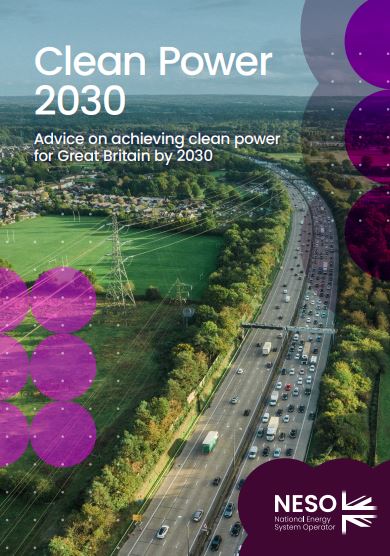The National Energy System Operator (NESO) has unveiled its comprehensive report, Clean Power 2030, outlining the critical steps required to achieve a fully clean electricity system in Great Britain by the end of the decade. This ambitious plan highlights a transformative approach to renewable energy, underpinned by collaboration, innovation, and significant infrastructure investment.
The Vision for Clean Power
NESO defines a clean power system as one where Great Britain’s electricity demand is met predominantly by renewable and low-carbon energy sources, with less than 5% of generation coming from unabated gas. This shift aims to provide a secure, affordable, and sustainable energy future while reducing dependency on volatile global gas markets.
Clean Power 2030 Report
The Clean Power 2030 report from the National Energy System Operator (NESO) outlines a bold plan to transform Great Britain’s energy system by 2030.
By scaling up renewables, modernising the grid, and embracing demand-side flexibility, the report sets a clear pathway to achieving a secure, sustainable, and low-carbon power system, reducing reliance on gas and unlocking economic opportunities.
Download and read the report by clicking on the below.
Key Pillars of the Clean Power Transition
- Scaling Up Renewable Energy
- Offshore Wind: Doubling current capacity to 43–50 GW, making it the cornerstone of the clean power system.
- Onshore Wind and Solar: Significant expansion, with solar tripling to 47 GW and onshore wind increasing to 27 GW by 2030.
- Low-Carbon Dispatchable Power: Incorporating carbon capture, storage technologies, and hydrogen for backup during periods of low renewable output.
- Network Expansion and Modernisation
- Over 5,500 km of new onshore and offshore transmission infrastructure is required to support renewable integration.
- Accelerated grid connection reforms to prioritise ready-to-deploy projects.
- Demand Flexibility and Digitalisation
- Expanding demand-side flexibility by four to five times, enabling smarter energy use through digital tools like smart appliances and dynamic pricing.
- Increasing storage capacity, including batteries and long-duration storage, to stabilise the grid.
- Regulatory and Planning Reforms
- Streamlining planning processes to accelerate project approvals.
- Addressing supply chain and workforce challenges to meet ambitious deployment timelines.
Critical Challenges and Opportunities
Delivering a clean power system by 2030 presents logistical and economic challenges, including the need for over £40 billion in annual investment. However, this investment is expected to:
- Reduce reliance on gas imports.
- Mitigate exposure to global energy price fluctuations.
- Create substantial economic and job opportunities across the UK.
Benefits for Consumers and Communities
The transition to clean power offers far-reaching benefits:
- Enhanced energy security and affordability by reducing dependency on fossil fuels.
- Opportunities for households to engage in the energy system through smart technologies and cost-saving initiatives.
- Reduced environmental impact and improved public health outcomes.
A Call for Collective Action
NESO’s report emphasises the importance of collaboration across government, industry, and communities. Achieving clean power by 2030 demands urgency, innovation, and commitment to ensuring a secure and sustainable energy future for Great Britain.
For further insights, visit the NESO website to access the full Clean Power 2030 report and its supporting analyses.
Notes to Editors:
Contact Information:
- This article is written by Jules Daly, Marketing and Communications Manager at Powersystems.
- Email jules.daly@powersystemsuk.com Telephone 01454 318000
- Photography Copyright please credit all images used to powersystemsuk.co.uk
Powersystems are powering the transition to a carbon free future
Powersystems is a leading high voltage specialist electrical engineering company with over 48 years of experience. Renowned for its expertise and reliability, Powersystems has become a trusted provider of design, installation, and commissioning services for electrical infrastructure and grid connections across the UK.
As the first Lloyds National Electricity Registration Scheme accredited Independent Connection Provider (ICP), Powersystems has been delivering contestable grid connections at voltages up to 132 kV for 28 years.
Since 2000, Powersystems has successfully connected over 6.1 gigawatts of renewable energy to the UK electricity grid. Our projects span many sectors from onshore and offshore wind, solar energy, tidal and hydroelectric power, electric vehicle infrastructure, as well as generation installations for short-term operating reserves (STOR), combined heat and power (CHP), grid stability initiatives such as rotating stabilisers, battery energy storage systems (BESS), and commercial industrial private wire networks.
In collaboration with partners, Powersystems has connected 30% of all onshore wind farms in the UK, contributing significantly to the nation’s renewable energy capacity to collectively work towards a sustainable future to help the UK achieve Net Zero by 2050.
Our commitment to excellence is reflected in our integrated management systems, which are ISO accredited, and our rigorous approach to health and safety under the ‘Priority No.1’ brand, ensuring best practices across the industry.
Powersystems UK Ltd. is an employee-owned business that values the well-being of its employees, fostering an environment where innovation is encouraged, and everyone is empowered to share ideas and contribute to the company’s success.
Speak to Powersystems today
You can contact us as follows


